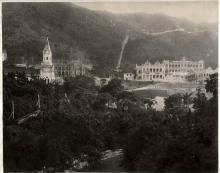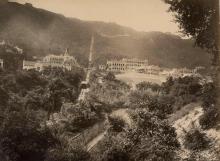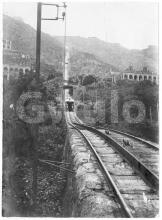Current condition
Demolished / No longer exists
Date completed
(Day, Month, & Year are approximate.)
Date closed / demolished
(Day, Month, & Year are approximate.)
Western half of building was demolished a few years earlier
Previous place(s) at this location
Later place(s) at this location



Comments
Page 83 of the 1938 Street…
Page 83 of the 1938 Street Index (image 177 in the viewer) lists this building under Macdonnell Road South Side:
I think 38 and 10 are the new and old street numbers for it.
Ballinode
Present Eva Court (36 Macdonnell Road) and Morning Light Apartments (38A-D Macdonnell Road).
Date of
Ballindae'sBallinode's completion is not certain yet. It came into existence after the 3rd generation of Union church on Kennedy Road (i.e. after 1891), after the peak tram bridge over Macdonnell Road (i.e. after 1892), and appeared as construction site in other peak tram photos in late 1890's."1901 map" shows the name of the 2-storey building as Ballindae (see notes). The 10 arcs on the northern facade often appeared in the background in the south of the 3rd generation Union Church on Kennedy Road.
The western part (can still be seen in https://gwulo.com/atom/26712) had already been demolished in 1946-47 as shown in Hedda Morrison's photo and https://gwulo.com/atom/37355
In 1947-1948, Lindo Court, a 7-storey building, was built on the site of the western part (https://gwulo.com/atom/19399). This co-existed with the remaining eastern part of
BallindaeBallinode (https://gwulo.com/atom/40086).In 1954, the eastern part was rebuilt as No. 38A-D Morning Light Apartments (6-storey).
In 1979, the western part was rebuilt as No. 36 Eva Court (22-storey).
(Copied from the obsolete entry of "Ballindae". The name "Ballindae", as appeared in "1901" map, is likely to be a misspelling of "Ballinode" [Street Index 1938]. Both names were used for the same building. With the fact that some houses in the vicinity were named after places, the latter makes much sense to be adopted in this entry. The "Ballindae" crossed-out above only indicates places of such changes.)